Harnessing Promotion Technology on iPads for Marketing Success


Intro
The convergence of promotion technology and mobile devices such as iPads has significantly reshaped marketing endeavors in recent years. With the increasing digitization of consumer experiences, businesses pivoted to utilize versatile gadgets that combine functionality with cutting-edge promotional tools. The iPad stands out in this context for its seamless user interface and adaptable applications that strongly resonate with brands and consumers.
This article investigates how companies harness the power of iPads alongside promotion technologies to achieve heightened engagement and effective communication strategies. By thoroughly exploring the features of promotional tools and the unique capabilities of iPads, the discussion aims to shed light on the extensive impact of such integrations.
Product Overview
Description of the product
The iPad is not just a tablet; it has evolved into an essential tool for marketing professionals. Its portability, high-resolution display, and extensive app ecosystem make it an ideal choice for conducting business presentations, showcasing products, and engaging consumers in real-time environments. As promotion technology evolves, the iPad’s capabilities continue to expand, creating fertile ground for innovative marketing strategies.
Key features and specifications
- Retina Display: Provides crystal-clear visuals that enhance the presentation of marketing content.
- App Ecosystem: A vast range of applications tailored for creating, sharing, and analyzing promotional content.
- Portability: Lightweight and easy to carry, allowing marketers to operate on-the-go.
- Performance: Powerful processors that enable smooth multitasking and quick response times, crucial in high-stakes marketing environments.
These features collectively facilitate a more engaging consumer experience, allowing brands to effectively communicate their message.
In-Depth Review
Performance analysis
When examining the performance of iPads in marketing roles, one cannot overlook their ability to handle demanding applications. Marketing teams rely on data analysis tools and interactive presentation apps, which run smoothly due to the iPad's advanced hardware. The seamless integration of various promotional technologies—like augmented reality applications or point-of-sale systems—demonstrates how effective the iPad can be in enhancing marketing impact.
Usability evaluation
The user interface of the iPad is designed for simplicity, enabling even users less familiar with technology to navigate through complex promotional tasks. The responsiveness of the touchscreen promotes an interactive experience, which can be crucial for engaging potential customers at trade shows or in-store. Moreover, features such as multitasking and easy sharing add to the iPad's usability.
"The iPad serves as an invaluable resource that empowers marketing professionals to innovate and connect more personally with their audience."
In summary, the integration of promotional technology with devices like the iPad not only adds depth to marketing strategies but also fosters a more dynamic interaction between brands and consumers. This relationship continues to evolve, showcasing the critical role of technology in shaping marketing's future.
Understanding Promotion Technology
Promotion technology plays a crucial role in the modern marketing landscape. It encompasses a wide array of tools and platforms designed to enhance the effectiveness of marketing campaigns through data-driven insights. As the marketing sphere continues to evolve, businesses must grasp the significance of these technologies to remain competitive. This section explores the breadth of promotion technology, its historical development, and its essential components. By doing this, we aim to provide a comprehensive understanding for professionals seeking to optimize their marketing strategies.
Definition and Scope
Promotion technology refers to technological solutions that enable organizations to strategize, execute, and analyze marketing promotions. This includes software applications, automated systems, and data analytics tools that facilitate targeted marketing efforts. The scope of promotion technology has expanded significantly in recent years, accommodating social media promotions, mobile advertising, and loyalty programs, among other areas. The adaptability of such technology empowers brands to connect with consumers in more meaningful ways.
Historical Context
The concept of promotion technology has evolved dramatically over the last few decades. Initially, marketing relied heavily on traditional outreach methods like print advertisements and direct mail. With the emergence of the internet, the capabilities of marketing expanded, allowing companies to reach larger audiences at a lower cost. The evolution of digital marketing tools, such as email marketing, search engine optimization, and social media engagement, played a pivotal role in this transition. As technology continued to advance, sophisticated tools emerged, integrating analytics and real-time data for better campaign performance.
Key Components
The foundation of effective promotion technology lies in several key components:
- Data Analytics: This allows businesses to gather insights on consumer behavior, preferences, and trends, enabling more informed decision-making.
- Automation Tools: Automation decreases manual work, streamlining marketing processes to improve efficiency. This can include automated email campaigns or social media posting tools.
- Mobile Platforms: Given the rise of mobile usage, marketing strategies now incorporate mobile platforms to reach consumers on-the-go, ensuring accessibility and engagement.
- Social Media Integration: Promotion technologies now harness the power of social media channels for targeted marketing, fostering brand awareness and customer engagement.
Understanding these elements is essential for leveraging promotion technology effectively in concert with devices like the iPad, which further enhance marketing strategies.
Overview of iPad Technology
The iPad has fundamentally changed how businesses view marketing technology. Its role in promotion strategies has expanded as the device evolves. This section presents an overview of the iPad’s technology, examining elements like its technical specifications, operating system benefits, and user experience features. Understanding these aspects can help businesses harness iPads for promotional purposes effectively.
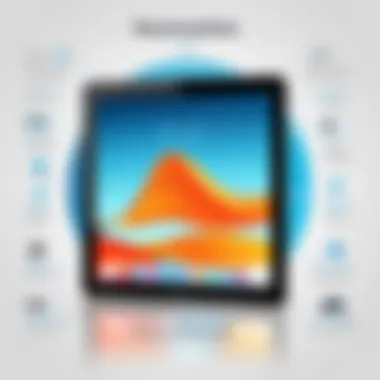
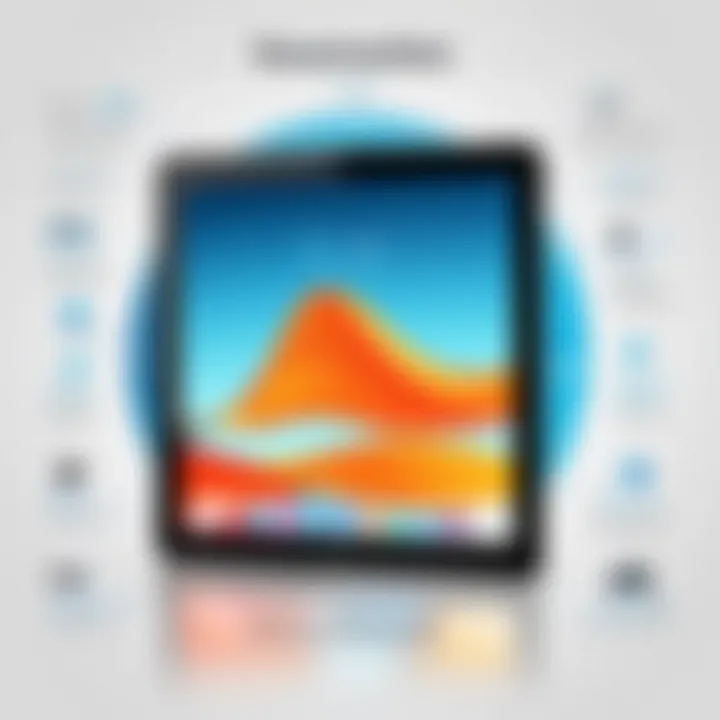
Technical Specifications
The technical specifications of iPads include a variety of features that cater to professional use. The latest models, such as the iPad Pro, boast high-resolution Retina displays that enhance visual marketing materials. The powerful A12X Bionic chip enables smooth multitasking, which is crucial when running various promotional applications simultaneously. A long battery life ensures uninterrupted use during events or presentations.
In addition to performance, storage options range from 64GB to 1TB. This flexibility is vital for businesses that require significant data storage, such as high-quality images, videos, and interactive content. Connectivity options, including Wi-Fi and cellular capabilities, allow for seamless access to the internet, essential for real-time marketing efforts.
Operating System Advantages
The operating system that powers iPads is iOS, known for its stability and security. This gives businesses confidence that their data and promotional materials are protected. iOS also offers a vast ecosystem of applications. Numerous marketing and analytics apps are specifically designed for iPads.
Updates to the operating system occur regularly, ensuring that users gain access to the latest features and security improvements. Additionally, the app store allows marketers to find tools suited for their promotional workflows, enhancing efficiency and productivity.
User Experience Features
The user experience on an iPad is intuitive, which reduces the learning curve for new users. Features like Touch ID and Face ID add secure yet convenient access. This convenience contributes positively to user engagement in a marketing context.
The ability to use the Apple Pencil opens further creative options for presentations and promotional design. Businesses can create interactive presentations that draw the audience’s attention. Additionally, iPads support multitasking capabilities, allowing users to work on multiple applications side by side. This flexibility improves workflow efficiency, essential for real-time adaptations in marketing strategies.
"The seamless integration of hardware and software in the iPad enhances marketing capabilities, turning the device into a valuable tool for promotion technology."
In summary, the iPad's technical specifications, operating system advantages, and user experience features combine to create a powerful device for businesses looking to innovate their marketing approaches. As industry dynamics change, understanding these core elements will play a pivotal role in effectively utilizing iPads in promotional tech.
Integrating Promotion Technology with iPad
The integration of promotion technology and iPad devices marks a significant shift in how businesses approach their marketing strategies. This combination not only enhances the overall effectiveness of promotional efforts but also allows for a smoother interaction between brands and consumers. Understanding this integration is essential for marketers looking to stay ahead in an increasingly complex landscape.
With iPads' portability and user-friendly interface, businesses can leverage various software solutions that optimize promotional efforts. This means that marketing campaigns can be executed in real-time, capturing consumer engagement in its most vital moments.
In addition to software, hardware compatibility plays a crucial role. iPads are compatible with a range of promotional tools, thus ensuring seamless integration within existing technology ecosystems. Furthermore, the data analytics capabilities provided through this merger enable marketers to analyze consumer behavior and tailor campaigns accordingly.
Software Solutions
Promotion technology has evolved rapidly, and the software solutions available today are comprehensive. Applications like Adobe Spark and Canva can help businesses design attractive promotional materials directly on an iPad. These platforms offer templates and tools that simplify the graphic design process, making it accessible even to those with limited design experience.
Moreover, customer relationship management (CRM) software such as HubSpot or Salesforce can run smoothly on the iPad. This allows marketers to track customer interactions and manage data effectively while on the move.
For instance, with the use of these software solutions, marketers can create targeted campaigns based on demographic insights gathered from consumer interactions. This level of customization can substantially improve engagement rates and conversion.
Hardware Compatibility
The hardware capabilities of iPads contribute significantly to the effectiveness of promotion technology integration. iPads come equipped with high-resolution displays, powerful processors, and support for Apple Pencil. This allows for stunning visual presentations and detailed graphics, which are crucial in promotional materials.
Moreover, the iPad's capability to connect to various peripherals such as printers, presentation equipment, and external displays enhances its role as a promotional tool. With devices like the Logitech Crayon, marketers can create interactive presentations that resonate well with audiences.
The ability to use iPads in diverse settings—like trade shows or client meetings—affirms their versatility as a promotional solution.
Data Analytics Capabilities
The integration of data analytics with promotional technology on the iPad transforms raw data into actionable insights. Tools such as Google Analytics or Tableau can be accessed directly from iPads. These applications provide real-time data on consumer behavior, campaign performance, and engagement metrics.
By regularly analyzing this data, marketers can make informed decisions that enhance their promotional strategies. For example, if certain campaigns show higher engagement from specific demographics, adjustments can be made to target these groups more efficiently.
"Data-driven marketing is not just a trend; it is a necessity. The capabilities of the iPad allow marketers to access and analyze data in ways that were not possible before."
Benefits of Using iPads for Promotion Technology
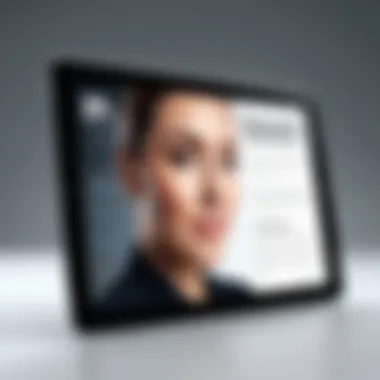
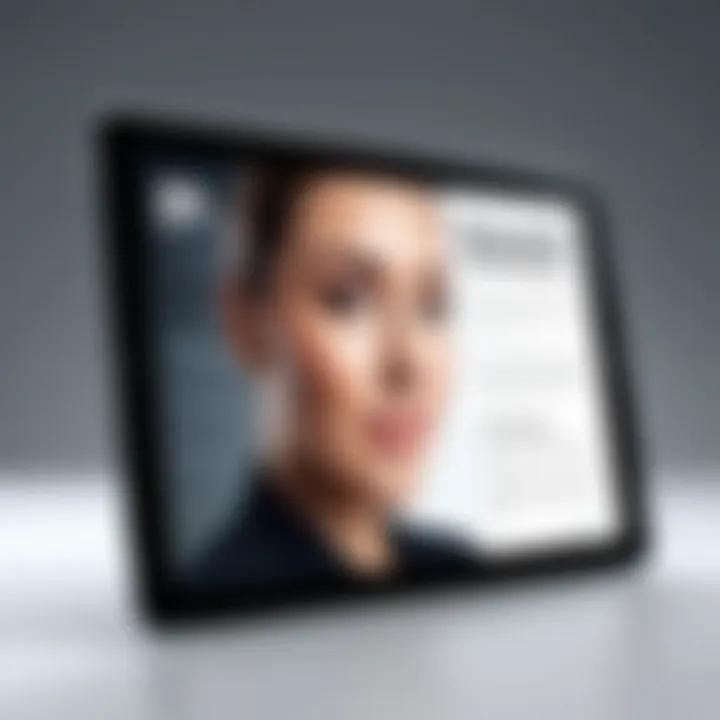
In the fast-paced world of marketing, technology plays a crucial role in shaping strategies. iPads, due to their unique features, are becoming a vital component in the promotion technology landscape. Understanding the benefits of using iPads for promotional purposes is essential for businesses aiming to enhance their marketing efforts. This section will explore the advantages of portability, interactive marketing opportunities, and user engagement techniques associated with iPads.
Portability and Accessibility
One of the primary advantages of using iPads in promotion technology is their portability. iPads are lightweight and easy to carry, allowing marketing teams to take their strategies on the go. Whether at events, in retail settings, or while engaging with clients, the mobility of iPads means that marketing professionals can access promotional tools anytime, anywhere. This flexibility is particularly beneficial when quick adjustments are needed to respond to dynamic market conditions.
Accessibility is another key factor. iPads come equipped with a user-friendly interface that promotes easy navigation. Marketing teams can utilize various applications designed for sales presentations or customer engagements. Additionally, iPads enable businesses to manage and distribute information efficiently, using digital formats rather than traditional print materials, which can be cumbersome and less adaptable.
Interactive Marketing Opportunities
The iPad provides a platform for unforgettable interactive marketing experiences. Brands can use touch-sensitive technology to create engaging apps or promotional materials that invite user participation. This interactivity transforms passive observation into active engagement, capturing the attention of potential consumers in ways traditional media cannot.
For instance, companies can develop custom applications where users can explore products through gamified experiences or virtual showcases. The adaptability of the iPad allows for the integration of video, animations, and real-time feedback, enriching the consumer interaction. This results in memorable experiences that strengthen the brand-consumer connection.
Moreover, the integration of technologies like Augmented Reality with iPads can lead to innovative marketing strategies. Consumers can visualize products in their environment, increasing the likelihood of purchase. This level of engagement attracts tech-savvy individuals and gadget lovers, who appreciate modern and immersive technologies.
User Engagement Techniques
Effective user engagement is vital for successful marketing campaigns. The iPad's capabilities facilitate various techniques that resonate with consumers on a personal level. Marketing teams can use the iPad to provide personalized content tailored to individual preferences. By analyzing user behavior through data analytics, campaigns can be adjusted in real-time to reflect changing interests or trends.
Interactive storytelling is another approach made possible by iPads. Brands can craft narratives that consumers can participate in, allowing them to feel a part of the experience. This technique not only boosts engagement but also cultivates brand loyalty.
Additionally, leveraging social media through iPad applications can enhance user engagement significantly. Marketing teams can encourage users to share experiences online, creating organic word-of-mouth promotion. Platforms like Facebook and Reddit can act as channels for brand interaction, supported by the ease of using an iPad.
"Combining iPads with promotion technology creates a versatile environment for engaging modern consumers effectively."
The benefits of using iPads in promotion technology are clear. Their portability, interactive capabilities, and user engagement techniques provide businesses a powerful way to enhance marketing strategies. As companies increasingly adopt these tools, the effectiveness of promotional efforts becomes more pronounced.
Case Studies of iPad Promotions
In the discussion of how promotion technology intertwines with iPads, case studies play a pivotal role. They highlight practical implementations and offer insights on the effectiveness of marketing strategies across diverse sectors. By examining real-world examples, it becomes easier to identify best practices, understand customer engagement, and measure overall success. Case studies also allow businesses to learn from one another, adapting successful tactics to their unique contexts. From retail to brand ambassador programs, these case studies illuminate the innovative ways companies are leveraging iPads to transform their marketing initiatives.
Retail Sector Innovations
The retail sector frequently leads the charge in adopting new technologies. With iPads, retailers have found a versatile tool that not only enhances the shopping experience but also streamlines operations. For instance, major brands like Apple and Nike utilize iPads for in-store customer engagement. These devices enable sales associates to provide instant access to product information, enabling a personalized shopping experience.
According to a report published by RetailTech, nearly 70% of retailers indicate that mobile devices have improved customer satisfaction. These innovations often include interactive displays and mobile point-of-sale systems, which simplify transactions. Additionally, by integrating promotion technology, retailers can send personalized offers directly to iPads, thus boosting sales and customer loyalty.
Event Marketing Successes
Event marketing represents another area where iPads have made significant inroads. Brands such as Samsung and Coca-Cola have successfully employed iPads at various events to engage attendees in unique ways. By using iPads for digital sign-ups, live polling, and interactive experiences, brands can create memorable moments that resonate with consumers.
For instance, during the Cannes Lions International Festival of Creativity, many companies used iPads for interactive presentations. Attendees could engage with the content directly, leading to higher retention and interest levels. This real-time engagement can massively increase brand awareness and social media visibility.
"Brands that fail to adapt to new technology in event marketing risk losing touch with their audience."
Brand Ambassador Programs
Brand ambassador programs have also benefited from the integration of iPads in promotional strategies. Companies like Red Bull and GoPro empower their ambassadors with iPads to capture content and share brand messaging effectively. These iPads allow users to create high-quality videos and images, which can then be instantly uploaded to various platforms. The immediacy provided by these devices enhances the authenticity of marketing campaigns, creating a genuine connection between consumers and brands.
Such programs not only increase brand visibility but also encourage ambassadors to share their personal experiences, fostering trust among their followers. The data collected through these interactions helps brands refine their targeting strategies.
Overall, case studies serve as a valuable resource in understanding how iPads can be effectively used in promotion technology, providing insights into innovative practices and measurable outcomes.
Challenges in Adopting Promotion Technology
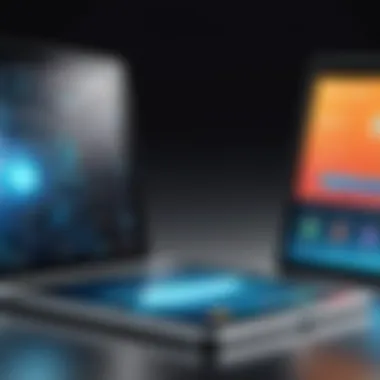
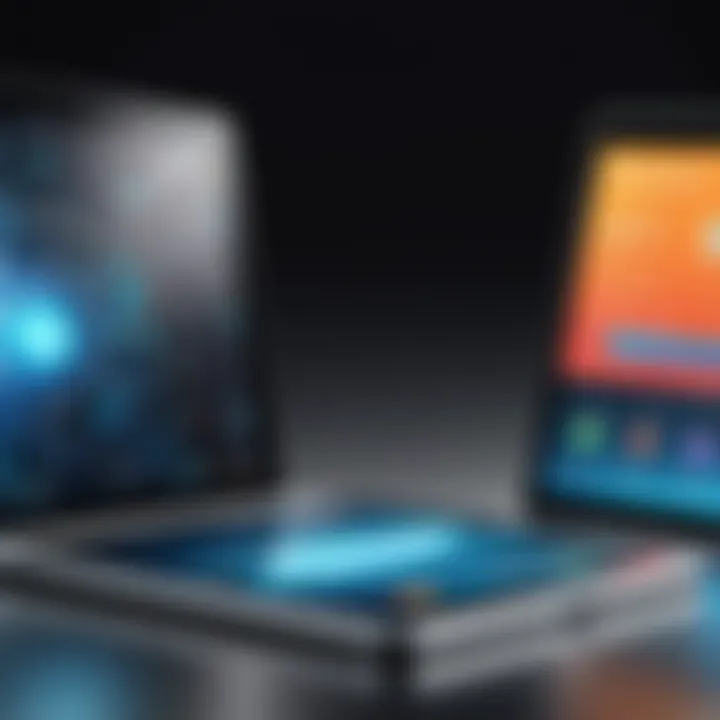
The integration of promotion technology with devices like the iPad represents a significant opportunity for businesses to enhance their marketing strategies. However, the process is not without its challenges. Understanding these obstacles can help businesses prepare effectively and strategize for successful implementation.
Cost Implications
One major challenge in adopting promotion technology is the financial investment required. Businesses must evaluate the costs associated with software purchases, hardware upgrades, and potential maintenance expenses.
- Software Costs: Many promotion technologies come with subscription models that can accumulate over time. Organizations should assess if the long-term benefits justify the initial expenditures.
- Hardware Investments: Upgrading hardware, especially in retail environments, may involve buying new iPads or additional peripherals. This adds to the overall cost structure businesses must consider, ensuring that expenditures align with their marketing budget.
- Return on Investment (ROI): Companies should conduct thorough analyses to understand the potential ROI from integrating these technologies. Without a clear projection of financial returns, spending on promotion technology may seem risky.
Training and Implementation
Another crucial challenge is ensuring that staff are trained adequately to use the new technology. An effective rollout of promotion technology requires more than just acquiring the tools; it needs a commitment to proper training and consistent support.
- User Familiarity: Employees must become acquainted with both the promotion technology and the iPad to utilize them effectively. This involves structured training sessions that cover software usage, hardware features, and troubleshooting steps.
- Ongoing Support: Training should not be a one-off event. Regular follow-up sessions can help teams stay updated on system changes or new features. Continuous support increases employee confidence in using the technologies, which directly impacts marketing success.
Maintaining User Data Privacy
As technology continues to develop, privacy concerns become more prevalent. Companies utilizing promotion technology must ensure robust measures are in place to protect user data.
- Data Handling Practices: Organizations need to understand how data is collected, stored, and used in marketing efforts. Transparency with customers builds trust, hence businesses should implement clear privacy policies and inform users about their data handling practices.
- Compliance with Regulations: Adhering to local and international data protection regulations, such as GDPR, is crucial. Failing to comply can lead to severe penalties and damage to the brand’s reputation. Regular audits and legal consultations can help navigate these complexities.
"The challenges in adopting promotion technology are significant but can be overcome with strategic planning and continuous training."
Future Trends in Promotion Technology and iPads
The intersection of promotion technology and iPads offers a fertile ground for innovation in marketing strategies. Understanding future trends in this realm is crucial for businesses aiming to stay competitive. This section will dive into pertinent elements such as augmented reality, artificial intelligence, and sustainability. Each of these components carries the potential to shape how companies engage with their audience and optimize their marketing efforts.
Augmented Reality Integrations
Augmented reality (AR) is increasingly influencing consumer engagement. With the capabilities of iPads, brands can create immersive experiences that connect customers more deeply with products. Imagine trying on clothing or visualizing furniture in one’s home environment through an iPad app. AR significantly enhances customer interaction, leading to higher conversion rates. Furthermore, brands like Ikea have already employed AR in their marketing strategies, allowing customers to visualize how furniture fits in their living spaces via the iPad. This trend demonstrates how technological integration streamlines the decision-making process for consumers.
Companies considering AR should note the importance of seamless integration. The iPad's hardware and software enable high-quality graphics and responsiveness. As user adoption of AR grows, companies must invest in developing engaging applications that take full advantage of this technology. Updating and optimizing AR content will be essential to maintain relevance.
AI-Powered Marketing Strategies
AI represents another vital trend reshaping marketing. Businesses leveraging AI can analyze massive amounts of consumer data to derive actionable insights. iPads are particularly useful in data-driven environments because they can run sophisticated AI analyses in real time. Personalization, a hallmark of successful marketing campaigns, is significantly improved through AI. Tailored content delivered through iPad interfaces can enhance user experience and foster brand loyalty.
"Artificial intelligence is not just a tool; it's a revolutionary force that is changing the way we approach marketing."
Utilizing AI can help brands predict consumer behavior and preferences. For instance, algorithms can suggest products based on previous browsing history. Companies that adopt AI-driven strategies can expect more efficient ad targeting and enhanced user engagement. The combination of AI and iPads not only offers sophisticated analytics but also supports interactive marketing approaches.
Sustainability Considerations
Sustainability must be a fundamental consideration in future marketing strategies. Consumers are increasingly concerned about the environmental impact of their purchases. Businesses leveraging iPads can promote sustainability through digital campaigns rather than traditional print media, reducing their carbon footprint. For example, companies can create digital catalogs and interactive ads to showcase their products, effectively minimizing waste.
Adopting eco-friendly practices within promotion technology not only caters to consumer demand but also enhances brand reputation. Providing transparent information about sustainability initiatives through iPads can drive engagement and trust. Brands focusing on sustainability need to communicate their commitment clearly while also demonstrating the tangible impacts of their efforts.
Ending
The conclusion of this article serves a critical role in reaffirming the significance of integrating promotion technology with iPads for modern marketing strategies. This integration not only showcases innovative approaches but also emphasizes the immense potential to enhance user engagement and improve brand visibility.
Summarizing Key Insights
As we have discussed throughout the article, several key insights emerge:
- Synergy of Technologies: The combination of promotion technology and iPads creates a platform that benefits both marketers and consumers. The interactive capabilities of the iPad enhance promotional efforts, making campaigns more engaging.
- Data-Driven Decisions: Utilizing iPads allows for real-time data analytics. Businesses can gauge consumer behavior and adapt their marketing strategies quickly, enhancing overall effectiveness.
- Augmented Reality and AI: The incorporation of these advanced technologies into promotional practices unlocks new dimensions of marketing. They facilitate personalized experiences that resonate with users, thus increasing conversion rates.
Ultimately, the role of the iPad in promoting technology is transformative. It exemplifies how digital tools can create meaningful interactions between brands and their audiences.
Final Thoughts on Integration
In summary, the integration of promotion technology with iPads is not merely a trend; it represents a significant shift in how businesses approach their marketing strategies. This integration fosters a more connected and responsive marketplace.
Brands that embrace these advancements can gain a competitive edge by optimizing consumer interactions and enhancing marketing outcomes. Future trends, such as augmented reality and AI-driven marketing strategies, promise to further evolve this landscape. Companies must stay adaptable and committed to leveraging these tools to achieve long-term success.



